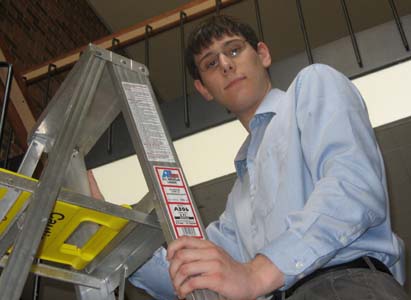

Venture Boldly

Comic book superheroes frequently encounter occupational injuries. But Knox Sam Flanders '09, an economics major, set aside his comic book hobby to research real-world workplace fatalities.
Flanders, a comic book artist and writer since he was a child, spends a couple of hours a week in a online comic book community, as his alter ego Andrew. The community is a fictional city where art battles occur. “The interaction can be a fight, talk, bowling or art competition,” he says.
His alter ego is a journalist named Andrew. "In the comic tradition, some of these people are ruthless and a lot of them have super powers." But, Andrew is "nice to a fault," Flanders says.
This past summer, Flanders stepped out of this Web-based community to assist economics professor Carol Scotton in investigating the incidence of workplace fatalities by occupation and industry. He entered the database world to examine survey data from the Current Population Survey (CPS), collected on a monthly basis by the U.S. Census Bureau and the Bureau of Labor Statistics. His goal was to understand how employers and employees provide different assessments of whether a job is considered dangerous and to what extent.
Job patterns, working relationships, the rise in self employment, sub-contracting and outsourcing of work, pose safety and health risks problems in the workplace.
Flanders examined two set of measurements. The first was a population database consisting of employee surveys. "This is where an employee says 'I am a construction worker or an electrician." Self-reporting can be a subjective assessment in itself. “Sometimes an employee who works as an electrician at a school might think they are in the [construction industry], but they are actually in education,” says Flanders.
The second set of measurements was based on what the companies themselves report about their employees and the hazards they face. “One thing we are looking at is whether the information we get from the industries is better than the information we get from the [employees],” he says.
Employees want to know the “danger factor” of their job. So, too, insurance companies want to know the level of risk associated with an occupation. "We are looking at different measurements to see which fits best that prediction of a dangerous job and which is better."
The level of danger is also important information when applying for a job. An employee would expect to be paid for hazardous duty, or else would chose to do a less dangerous job. "If all else is equal, if the only difference between two jobs is that one is more dangerous, you would expect higher pay. That theory is not always true in practice," Flanders says.
Flanders is compiling the raw data of large government files that are 40,000 records long. By some standards, this is in itself a hazardous job. "I am aggregating the data into smaller data sets that are easier to get a significant value."
New technologies and dynamic workplace environments have changed the nature of work, leading to new health and safety issues, but that hardly affects superheroes. And, when pressed about what his online alter ego, Andrew, would think of his research Flanders says, "He would want to know if it saves lives."
Research could lead to companies investing money in safety. "From my knowledge and not the data of this research, there are a number of factors that influence pay. Danger, skill, respect that the job commands, and dangerous jobs or undesirable jobs all factor into why people take a job. Danger is only one factor."
The Knox Community
Flanders is working on a sequential art club that he plans on launching at Knox during the fall semester. "Comics are a community, but Knox is a community too. That is the biggest thing about Knox…the community."

Sam Flanders '09 is researching work place fatalities.
Published on August 27, 2008